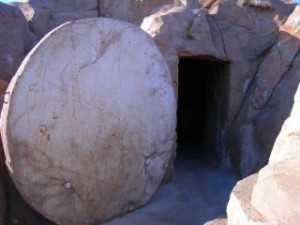 In the last post, we noted powerful evidence for the empty tomb: enemy attestation. The religious authorities of Jerusalem and the early Church both agree: On Easter Sunday, the body of Jesus is not in the tomb. The question is: Why? Christians, of course, affirm the reason is the bodily Resurrection of the Lord. The authorities concocted a different tale: they said the disciples stole the body. Did they? Not a chance.
In the last post, we noted powerful evidence for the empty tomb: enemy attestation. The religious authorities of Jerusalem and the early Church both agree: On Easter Sunday, the body of Jesus is not in the tomb. The question is: Why? Christians, of course, affirm the reason is the bodily Resurrection of the Lord. The authorities concocted a different tale: they said the disciples stole the body. Did they? Not a chance.
First, the tomb was guarded, most likely by Roman soldiers. Matthew’s Gospel mentions that the religious authorities bribed the guards to say that while they slept, the disciples pilfered Jesus from the tomb. That Roman soldiers would fall asleep on the job, and somehow not be woken by the commotion of men rolling away the massive stone at the mouth of the tomb, is laughable enough. But even if that were possible, who knows what’s happening while one is asleep, anyway? But there’s an even more convincing reason this argument doesn’t work.
Almost anyone would grant that people are often willing to die for what they believe to be true. Suicide bombers come immediately to mind. But no one dies for something they know to be a lie. And the disciples would certainly know if Jesus had actually risen from the dead and appeared to them, or if they had, in fact, hidden his corpse in a trunk somewhere. But if they had really stolen the body, why would they go and get themselves killed by preaching that Jesus had been resurrected? I mean, it’s not as if they had anything to gain, humanly speaking, by their message. It’s not as if sprawling mansions along the Mediterranean coastline awaited. They could only look forward to beatings. imprisonments, and an almost certain death. The truth is that they proclaimed the Resurrection because they were convinced by the encounters they had with the risen Christ. They proclaimed it because it was true.

